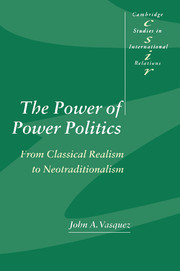Book contents
- Frontmatter
- Contents
- List of figures
- List of tables
- Preface
- Introduction
- Part I The Original Text: Classical Realism and Quantitative International Politics
- Part II Neorealism and Neotraditionalism: International Relations Theory at the Millennium
- 9 Retrospective: neorealism and the power of power politics
- 10 The promise and potential pitfalls of post-modernism: the need for theory appraisal
- 11 The realist paradigm as a degenerating research program: neotraditionalism and Waltz's balancing proposition
- 12 Mearsheimer's multipolar myths and the false promise of realist policy prescriptions: the empirical inaccuracy of the realist paradigm
- 13 Challenging the relevance and explanatory power of the realist paradigm: the debate on the end of the Cold War
- 14 Conclusion: the continuing inadequacy of the realist paradigm
- References
- Name index
- Subject index
- CAMBRIDGE STUDIES IN INTERNATIONAL RELATIONS
9 - Retrospective: neorealism and the power of power politics
Published online by Cambridge University Press: 22 September 2009
- Frontmatter
- Contents
- List of figures
- List of tables
- Preface
- Introduction
- Part I The Original Text: Classical Realism and Quantitative International Politics
- Part II Neorealism and Neotraditionalism: International Relations Theory at the Millennium
- 9 Retrospective: neorealism and the power of power politics
- 10 The promise and potential pitfalls of post-modernism: the need for theory appraisal
- 11 The realist paradigm as a degenerating research program: neotraditionalism and Waltz's balancing proposition
- 12 Mearsheimer's multipolar myths and the false promise of realist policy prescriptions: the empirical inaccuracy of the realist paradigm
- 13 Challenging the relevance and explanatory power of the realist paradigm: the debate on the end of the Cold War
- 14 Conclusion: the continuing inadequacy of the realist paradigm
- References
- Name index
- Subject index
- CAMBRIDGE STUDIES IN INTERNATIONAL RELATIONS
Summary
Looking back at this book, which I began over twenty years ago, I am heartened to see that so much of it has stood the test of time. Although the book did not weaken the hold of the realist paradigm as much as I would have liked, it did help make certain contributions to the way we view international relations theory. I will begin this chapter with a brief review of these, but most of the chapter will deal with whether the work in international relations theory in the 1980s and 1990s has led me to reassess the two major tenets of the analysis – that the realist paradigm has dominated the field and that it has failed to provide an adequate guide to knowledge. The straightforward answer is – no. Indeed, if anything, the work of the past fifteen to twenty years has convinced me more than ever of the tenacity of the paradigm's grip on scholars, especially in the United States, and of the need to abandon it as a guide to both theory and practice. In short, this chapter will update why I think the claims I made about the realist paradigm in the original text are still valid. In this chapter, I will focus on neorealism, primarily Waltz, but also with some attention to Gilpin.
In the remaining chapters, I will focus on selected major intellectual currents within the discipline. In chapter 10, I examine the implications of post-modernism and post-positivism for the analysis herein.
- Type
- Chapter
- Information
- The Power of Power PoliticsFrom Classical Realism to Neotraditionalism, pp. 183 - 213Publisher: Cambridge University PressPrint publication year: 1999



